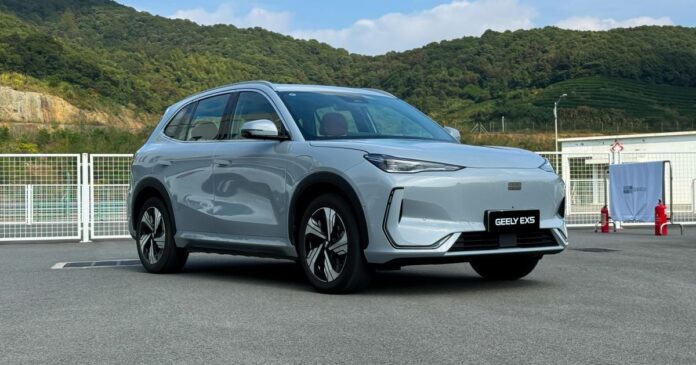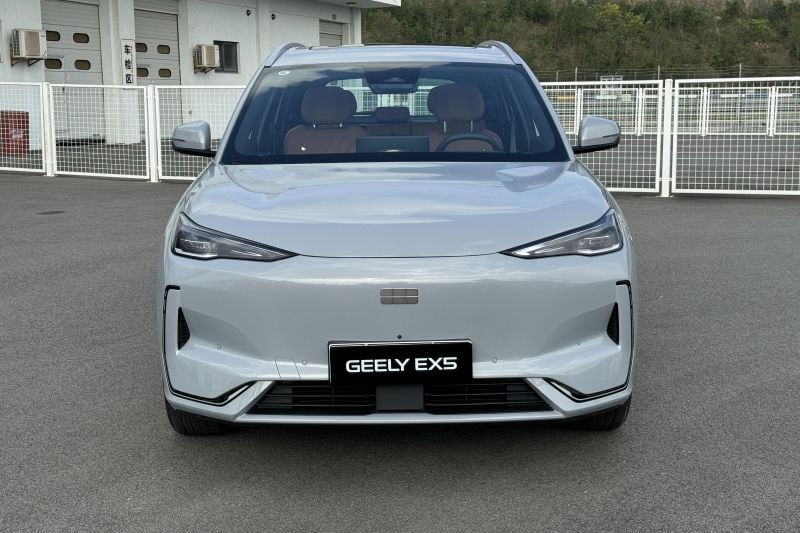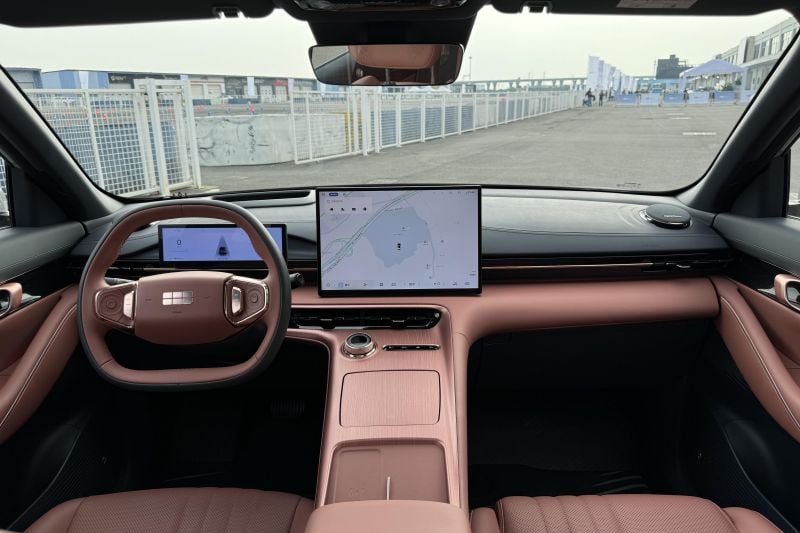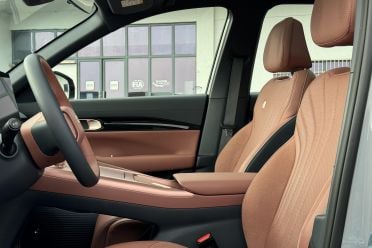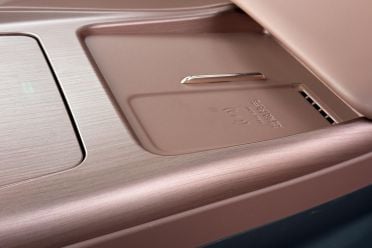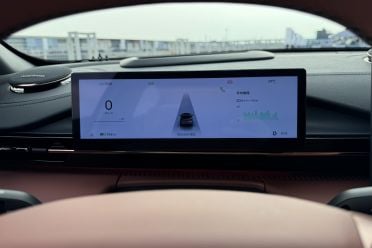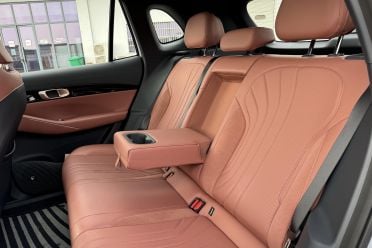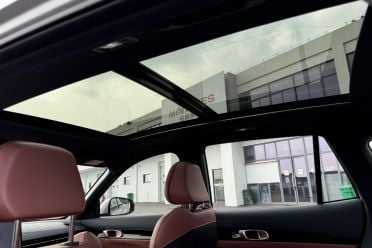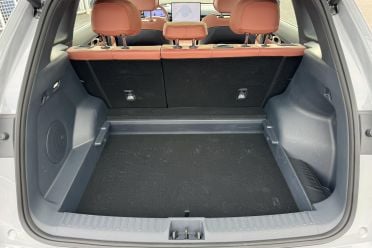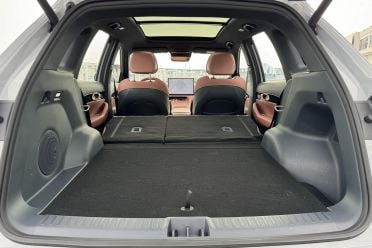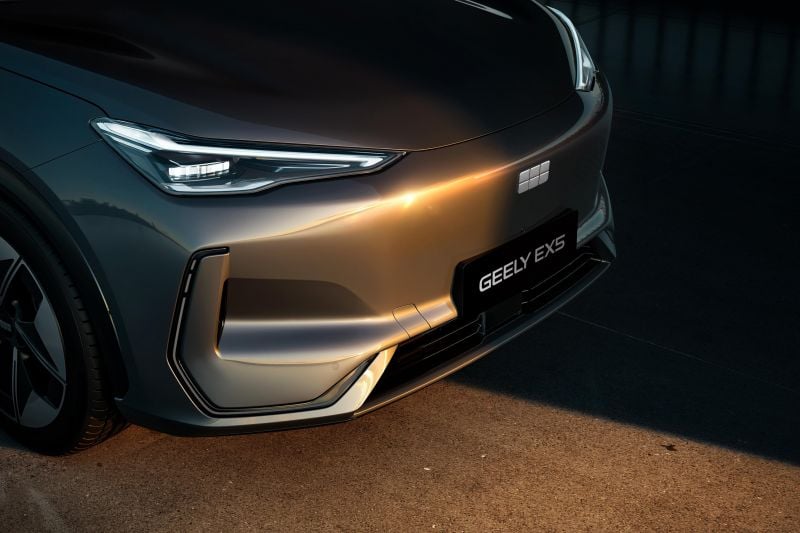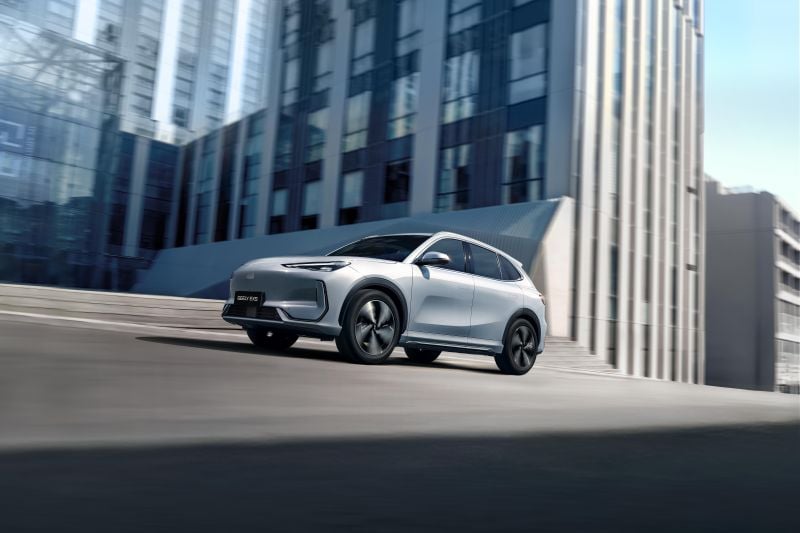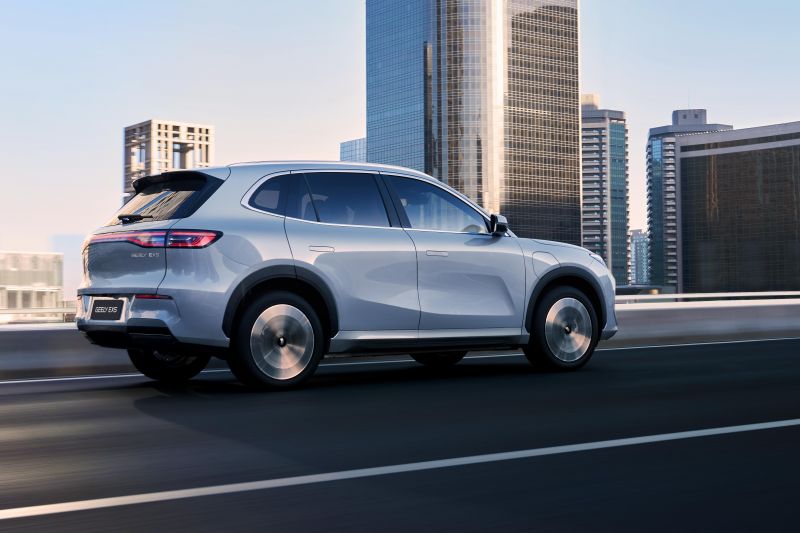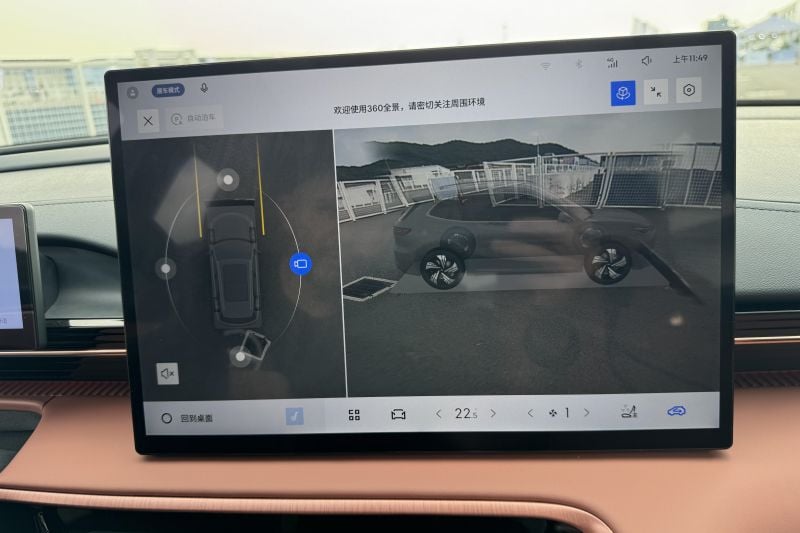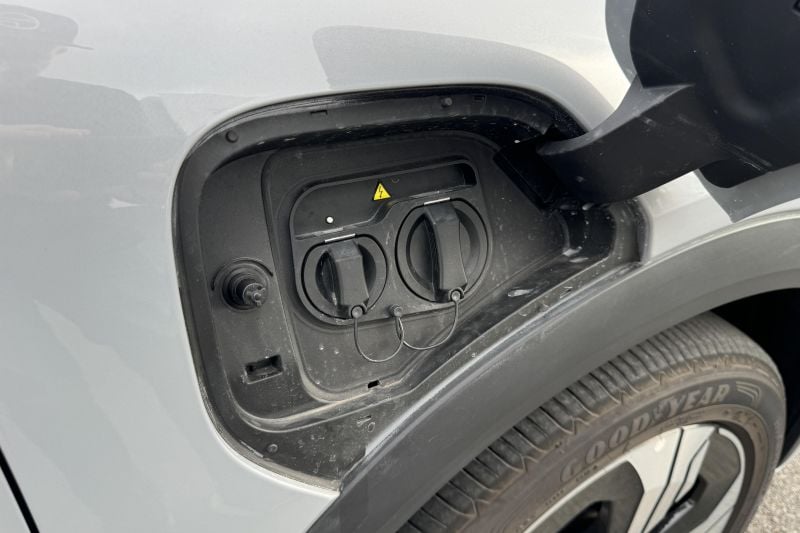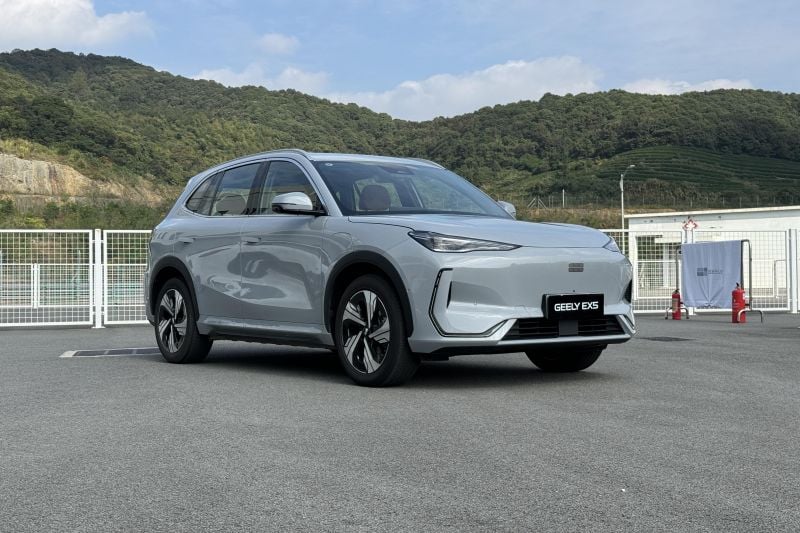You might not realise it, but there are plenty of Geely products already on the road in Australia… but none of them until this one will have worn the actual Geely brand name on them.
That’s because this Chinese auto giant also owns carmakers like Volvo, Polestar, smart, Zeekr and Lotus – all brands with a presence in Australia.
However, this brand is supposed to represent the mainstream market option – and the EX5 mid-sized electric SUV will be the first offering from Geely brand in Australia when it launches in 2025.
A lot of the finer details are still to be confirmed, but after our first drive of the Geely EX5 in China, it’s fair to say that this could be one to wait for if you’re thinking about a Tesla Model Y or many other electric vehicles it competes with.
How does the Geely EX5 compare?
View a detailed breakdown of the Geely EX5 against similarly sized vehicles.

Geely
EX5
Nobody knows…
Well, the staff at Geely’s HQ probably know, but they aren’t yet saying what exact pricing will be!
That’s understandable given there are still many factors to consider prior to launching any new model, and if we’ve learned anything over the last few years it’s that you don’t want to launch a car then have to cut the price soon after because the market has shifted.
However, when I asked about a sub-$50K starting price, I was told that the target is for this vehicle to be “approachable” for mass-market buyers.
Could that mean an entry price nearer to the BYD Atto 3 (from $44,499 plus on-roads), rather than closer to the Tesla Model Y (from $55,900 plus on-roads)? It would be fair to assume so.
Have your say in the comments about how much you think the Geely EX5 should cost.
The EX5 takes a similar tact to other EVs in this market segment, with a large multimedia display, digital instrument cluster, and plenty of interesting finishes and design touches.
But I think it feels a bit more high-end and less try-hard compared to other models with gimmicky swivel screens.
Indeed, the fit, finish and material quality all seem to be pretty good at first touch, with a stylish cabin design and multiple colour choices on offer, too.
I sat in one with a rose gold and pinkish-red two-tone colour scheme inside, and it felt special – admittedly perhaps not to all tastes, but still different to the festivals of black and grey in some rival models.
Another version on show had a white-on-white finish, which already looked a little dirty thanks to multiple backsides sliding in and out.
Exact colour choices and options are still to be confirmed, but what is expected to be standard is a set of electrically adjustable front seats with heating, cooling and massage functionality.
And, based on my quick experiences in the car, the comfort is excellent thanks to Geely’s so-called Marshmallow Series seats, which are super well cushioned yet still supportive.
The bottom ‘bar’ of the screen houses key controls including climate, seat heating/cooling and fan adjustment, and while a physical button would always be better in my opinion, it seemed simple enough to operate.
I didn’t get much of a chance to experience the intricacies of the media system – it was a rush on the day, and the screen was set to Chinese language – and again there’s an outright reliance on touch (or voice) controls.
On the voice control system, Geely says its ‘Hey Geely’ speech recognition function works with 10 languages and has more than 200 controls available, from adjusting the fan speed and temperature to opening the windows.
The Flyme sound system is a 16-speaker unit (including head restraint speakers like the Mazda MX-5), and audio quality seemed very impressive, too. It isn’t confirmed yet, but it is expected Apple CarPlay will be offered among a host of other connected apps, including satellite navigation, weather and more.
The cabin is well considered for storage solutions, with cupholders between the seats, a good-sized centre console bin, large bottle holders in the doors, and a lower storage tray that’s large enough for a small backpack or handbag.
There is a pair of slots for phones, including a wireless charging pad (up to 50W), and the requisite USB-A and USB-C ports are there, too.
The back seat is positively roomy, offering more space than some SUVs in the next size segment – that’s one thing the Chinese brands often get right.
With the driver’s seat set to my 182cm/6’0” position, I was able to slide into the back row with inches of room in front of my knees, and enough toe wiggle space to tap along to the beat, too. Another big plus is the completely flat floor, allowing for extra leg-spread room.
The seatback has some reclineability to it, and there was easily enough room above my head to feel comfortable – and the panoramic glass roof, which isn’t confirmed to be standard but might be, added to the airy feel of the cabin area.
Amenities include map pockets on the seatbacks, a flip-down armrest with cupholders, bottle holders in the doors, soft armrests, quality finishes, and ISOFIX child seat anchors in the window seats (plus there will be three top tether points too).
Boot space is a decent 461 litres with the seatbacks up, and that increases to a 1877L of cargo capacity with the rear seats down.
There is an adjustable boot floor with a massive storage well below it, too, which makes it super practical for storage, and Australian-spec vehicles will also feature an under-bonnet storage box, or ‘frunk’, which could be used to house your cables. Sadly though, there is no spare wheel – just a tyre repair kit.
The brand has two different battery-capacity versions of the EX5 internationally, but it isn’t clear yet if we’ll see both offered here in the Geely EX5.
| Specifications | Geely EX5 |
|---|---|
| Drivetrain | Single-motor electric |
| Battery | 60.2kWh LFP |
| Power | 160kW |
| Torque | 320Nm |
| Driven wheels | Front |
| 0-100km/h (claimed) | 6.9 seconds |
| Claimed range (WLTP) | 425 kilometres |
| Max AC charge rate | 11kW |
| Max DC charge rate | 100kW |
The smaller pack is a 49.5kWh unit made with Geely’s short-blade battery tech, using LFP chemistry. According to the lenient CLTC standard, it has 440km of driving range.
And then there’s the version we’re expecting Down Under, which is the bigger 60.2kWh pack and, thanks to the WLTP testing standard, has more realistic range figures.
Further specifications are still to be confirmed, but Geely has stated that the (more lenient, lab-based) CLTC efficiency figure for the EX5 is an astounding 11.9kWh per 100km, which would be class-leading for this type of vehicle. It could translate to a sub-14kWh WLTP figure.
Some terrific elements to the battery system include that it has both vehicle-to-load (V2L) and vehicle-to-vehicle (V2V) charging capability, but not vehicle-to-house (V2H) or vehicle-to-grid (V2G).
A mask, a helmet and access to the world-class Ningbo International Track – it sounds like a dream experience… in the right car.
But this electric SUV isn’t a race car. Not even close. And that was clearly evident as soon as I started to exit the pits in this China-spec vehicle.
It is vital to note that, according to Geely’s Aussie team, there will be a different dynamic tune for the EX5 before it arrives Down Under.
Officially: “The suspension of the EX5 will be tuned for Australian roads and will be firmer than what you have driven in the Chinese domestic market specification car.”
Thank goodness, because the tune of the springs and dampers in the model I tested was soggier than a bikkie that had been dunked in a cuppa… overnight.
That may be a bit unfair, but it was clear that the suspension for the Chinese-market model had been tuned for ultimate comfort, not unbelievably sharp cornering – and as a dad, that is something of an attractive attribute in a family SUV like this.
For example, the loping suspension setup managed a few big jolting elevation changes well, but during cornering it exhibited heavy lean and body roll due to the overly spongy springs and dampers.
The steering (which will hopefully also be tuned to Australian requirements) had a slow response about-centre, making it feel a bit ponderous when changing directions at pace.
Likewise, the stability and traction control in the model we tested in China was overtly interventional, robbing the vehicle of acceleration power when I planted my foot after a corner. It shouldn’t have felt sluggish – not with 160kW and 320Nm – but it did.
Add to that its front-wheel drive architecture that makes it feel like you’re being pulled out of corners, rather than pushed from behind like in a rear-wheel drive vehicle, and it was evident to me that this felt rather different to some of the better electric SUVs in the segment.
For the most part, though, it comes down to the tuning, which made the EX5 feel like a safety-first slowpoke in the situations I got to test it.
A series of software and hardware adjustments – not to mention Australian ADAS tuning – will hopefully amend these concerns, because otherwise it appears to be a relatively competitive vehicle.
Standard local specifications haven’t been confirmed yet, but the brand has announced a host of features that will be offered in the range.
Highlights include:
- 19-inch alloy wheels
- LED headlights
- LED daytime running lights
- LED tail-lights
- Fake leather interior trim
- 15.4-inch touchscreen media system
- 10.2-inch instrument display
- 16-speaker Flyme Sound stereo
- 256-colour ambient interior lighting
- Head-up display
- Panoramic glass roof
- Heated front seats
- Ventilated front seats
- Massaging front seats
- Electric front seat adjustment
A full pricing and specifications breakdown will be supplied closer to the EX5’s Australian launch.
There is no ANCAP or Euro NCAP rating for the EX5 as yet but, as with many of these new-gen Chinese-made models, it has all the requisite safety gear.
So let’s hope it all has some idea of how it needs to work when it comes to driving assistance.
Standard safety equipment includes:
- Autonomous emergency braking (AEB)
- Pedestrian, cyclist, junction detection
- Adaptive cruise control
- Lane keep assist
- Blind-spot monitoring
- Rear cross-traffic alert
- Driver attention monitoring
- Tyre pressure monitoring
- Surround-view camera
Ownership considerations rank pretty highly when it comes to EV customers, and Geely will want to get it right straight off the bat when it comes to warranty, servicing and other aftersales stuff.
There will be a network of Geely-specific dealers around Australia, starting with the more populous capital cities, and you can expect that those showrooms will have workshop facilities, too.
The warranty is likely to be at least five years for the vehicle itself, perhaps more. And the battery warranty is certain to be on-par with the major players in the EV scene, most of which offer an eight-year/160,000km battery pack warranty that guarantees at least a 70 per cent state of health for that period.
Servicing intervals and costs, as well as roadside assistance, are all still to be announced.
It feels like this EV is going to target the mainstream mid-sized SUV customer, and it should hit the target bang on if the pricing is right, and provided the company gets local chassis tuning right.
The Chinese model we tested was not dynamically engaging to drive, and nor was it as fast as some of its rivals.
But based on our brief first experience, the Geely EX5 could be a very intriguing addition to the Aussie market when it arrives in 2025.
Click the images for the full gallery
MORE: Everything Geely EX5

